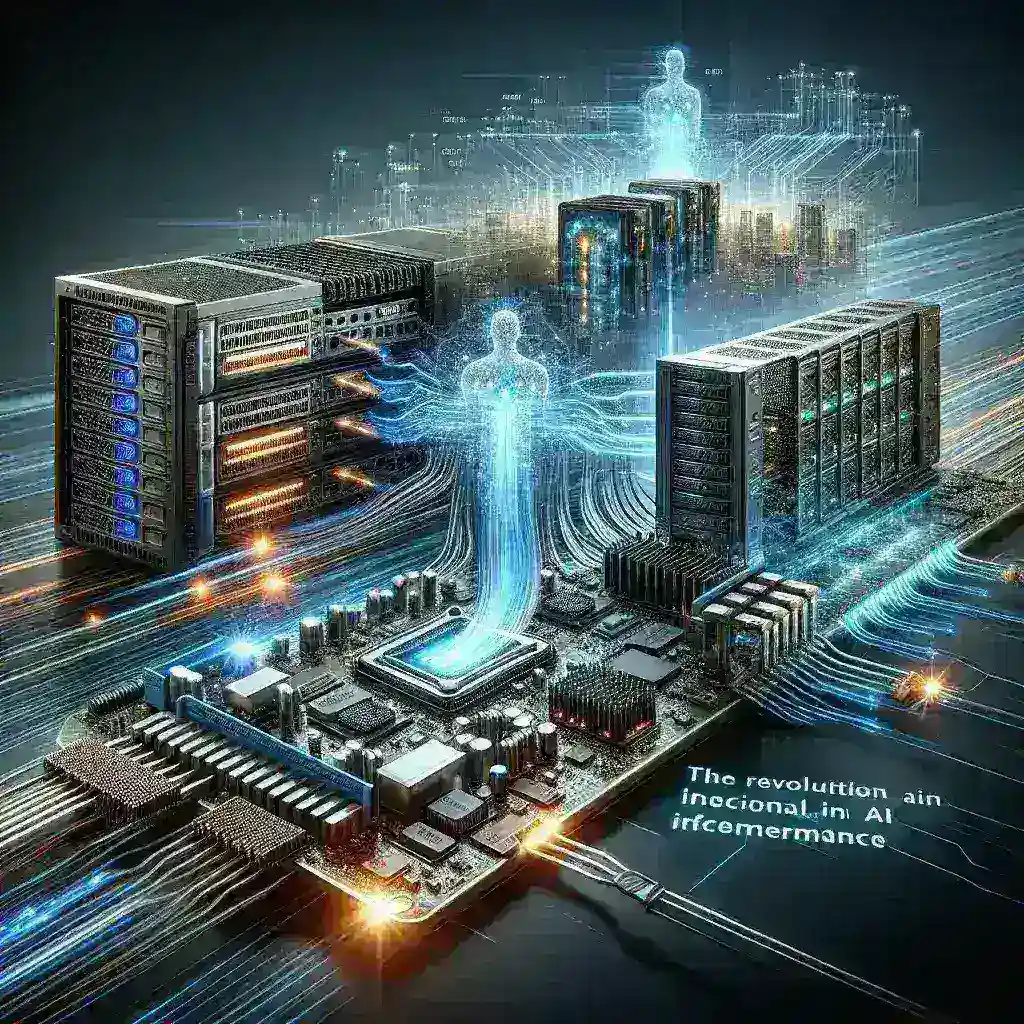Understanding GB300’s Integration in NVIDIA DGX B300 Systems for AI Inference
The artificial intelligence landscape is evolving at a breathtaking pace, with hardware capabilities serving as the foundation for computational breakthroughs. Among the most significant recent developments is the integration of NVIDIA’s GB300 Blackwell GPUs into the DGX B300 systems, marking a pivotal advancement in AI inference capabilities. This technological marriage represents not just an incremental improvement, but a fundamental shift in how organizations can deploy and scale their AI workloads.
As enterprises increasingly rely on AI inference to power real-time decision-making processes, the demand for more efficient, powerful, and scalable hardware solutions has never been greater. The GB300’s integration into DGX B300 systems addresses these needs head-on, offering unprecedented performance for the most demanding AI applications.
The Evolution of NVIDIA’s GPU Architecture Leading to GB300
To fully appreciate the significance of the GB300 Blackwell GPU architecture, it’s essential to understand the evolutionary path that led to its development.
From Hopper to Blackwell: A Quantum Leap
The previous generation Hopper architecture represented a substantial advancement in GPU computing, particularly for AI workloads. However, the Blackwell architecture, embodied in the GB300, takes this progress to new heights. Named after the mathematician David Harold Blackwell, this architecture was designed from the ground up to address the exponentially growing computational demands of modern AI systems.
The Blackwell architecture introduces several fundamental improvements over its predecessors:
- Significantly enhanced Tensor Cores optimized specifically for AI workloads
- Improved memory bandwidth and capacity
- Revolutionary new interconnect technology
- Advanced power efficiency features
- Specialized hardware accelerators for specific AI operations
These improvements collectively enable the GB300 to deliver up to 4x the inference performance of previous generation GPUs while maintaining similar power envelopes – a critical consideration for data center deployments.
Technical Specifications of the GB300 GPU
The GB300 represents the pinnacle of NVIDIA’s GPU engineering, with specifications that set new industry standards:
- Compute Cores: Up to 192 Streaming Multiprocessors (SMs)
- Tensor Cores: 4th generation design with specialized AI inference optimizations
- Memory: Up to 192GB HBM3e memory with over 8TB/s of bandwidth
- Interconnect: NVLink 5.0 providing up to 1.8TB/s bidirectional throughput
- Process Node: Advanced 4nm manufacturing technology
- Power Efficiency: Up to 25x better energy efficiency for inference workloads compared to previous generations
These specifications translate to real-world performance that fundamentally changes what’s possible in AI inference applications.
The DGX B300 System: Purpose-Built for AI Excellence
The DGX B300 system represents NVIDIA’s most advanced AI computing platform, designed specifically to harness the power of the GB300 Blackwell GPUs. As the successor to the widely adopted DGX H100 systems, the B300 introduces architectural innovations that maximize the potential of the new GPU technology.
System Architecture and Components
The DGX B300 is engineered as a complete AI supercomputer in a rack-mountable form factor. Its key components include:
- GB300 GPUs: Typically configured with 8 or 16 GB300 GPUs per system
- CPU: High-performance server-grade CPUs with PCIe Gen5 connectivity
- System Memory: Up to 2TB of DDR5 memory
- Storage: High-speed NVMe SSDs with capacities ranging from 15TB to 60TB
- Networking: Integrated InfiniBand or Ethernet connectivity with up to 800Gbps of bandwidth
- Cooling: Advanced liquid cooling systems to maintain optimal operating temperatures
What truly sets the DGX B300 apart is how these components are integrated and optimized to work together. NVIDIA’s engineering team has meticulously designed the system to eliminate bottlenecks, ensuring that the GB300 GPUs can operate at peak performance even under the most demanding workloads.
NVIDIA’s NVLink and NVSwitch Technologies
Central to the DGX B300’s architecture is the implementation of NVIDIA’s latest NVLink and NVSwitch technologies. These proprietary interconnect solutions enable the multiple GB300 GPUs to function as a single, cohesive computational unit:
- NVLink 5.0: Provides GPU-to-GPU communication at speeds up to 1.8TB/s, allowing for seamless memory sharing and workload distribution
- NVSwitch: Creates a unified memory architecture across all GPUs, enabling applications to utilize the aggregate GPU memory as a single pool
This high-bandwidth, low-latency connectivity is particularly crucial for AI inference workloads, where data often needs to be processed across multiple GPUs simultaneously to meet real-time requirements.
The Technical Synergy: How GB300 and DGX B300 Work Together for AI Inference
The integration of GB300 GPUs into the DGX B300 platform creates a synergistic relationship that dramatically enhances AI inference capabilities. This technical marriage enables several key advantages over previous generations and competing solutions.
Transformers and Large Language Models (LLMs) Performance
Perhaps the most impressive capability of the GB300-powered DGX B300 systems is their performance with transformer-based models, including large language models (LLMs) that have revolutionized natural language processing:
- Up to 30x faster inference for models like GPT-4, Claude, and Llama compared to previous generation systems
- Support for models with trillions of parameters with minimal latency
- Ability to run multiple concurrent inference workloads without performance degradation
- Optimized memory usage patterns that maximize throughput for transformer architectures
This performance leap enables organizations to deploy increasingly sophisticated language models in production environments where response time is critical.
Computer Vision and Multimodal AI Applications
Beyond language models, the GB300 integration excels at computer vision and multimodal AI inference tasks:
- Real-time processing of high-resolution video streams for object detection, segmentation, and tracking
- Simultaneous inference across text, image, audio, and video inputs
- Support for advanced neural rendering and AI-generated content creation
- Accelerated performance for graph neural networks and recommendation systems
This versatility makes the DGX B300 with GB300 GPUs an ideal platform for organizations working with diverse AI workloads that span multiple data types and modalities.
The Role of Specialized Inference Engines
One of the most significant innovations in the GB300 architecture is the inclusion of dedicated inference engines – specialized hardware accelerators designed specifically to optimize common inference operations:
- Transformer Engine: Purpose-built to accelerate attention mechanisms and other transformer-specific computations
- Dynamic Sparsity Support: Hardware-level optimizations for efficiently processing sparse neural networks
- Mixed Precision Acceleration: Advanced support for INT8, FP8, and other reduced precision formats while maintaining accuracy
These specialized engines allow the GB300 to achieve unprecedented efficiency for inference tasks, dramatically reducing both computation time and energy consumption compared to general-purpose computing approaches.
Software Ecosystem: Maximizing the GB300’s Potential in DGX B300
The hardware capabilities of the GB300-equipped DGX B300 systems are complemented by a comprehensive software ecosystem designed to maximize developer productivity and inference performance.
NVIDIA AI Enterprise and the DGX Software Stack
At the foundation of this ecosystem is NVIDIA AI Enterprise, a comprehensive software suite that includes:
- CUDA-X AI: Libraries and frameworks optimized for the GB300 architecture
- TensorRT: A high-performance deep learning inference optimizer and runtime
- NVIDIA Triton Inference Server: A flexible inference serving system for all AI frameworks
- NVIDIA DALI: Data loading and preprocessing library for accelerated pipeline optimization
- NGC Catalog: Pre-optimized containers, models, and helm charts for simplified deployment
This software stack is specifically tuned for the GB300 architecture, ensuring that applications can fully leverage the hardware capabilities of the DGX B300 system.
Framework Optimizations and Developer Tools
Beyond the core software stack, NVIDIA provides extensive optimizations for popular AI frameworks:
- PyTorch, TensorFlow, and JAX: Deep integration with GB300-specific features
- ONNX Runtime: Accelerated inference for models from any framework
- Inference microservices: Pre-built components for common AI services
- Profiling and debugging tools: Comprehensive performance analysis capabilities
These optimizations ensure that developers can easily transition existing models to the GB300 platform while achieving maximum performance without extensive code modifications.
Real-World Performance Benchmarks and Use Cases
The theoretical capabilities of GB300-equipped DGX B300 systems are impressive, but their real-world performance in practical applications is what truly matters to organizations deploying AI inference workloads.
Benchmark Results: Quantifying the Performance Leap
Extensive benchmarking of the GB300 in DGX B300 systems reveals extraordinary performance improvements across a range of inference tasks:
- LLM Inference: Up to 30x higher throughput for large language model serving compared to previous generation systems
- Real-time Video Analysis: Ability to process up to 4x more simultaneous video streams at the same latency targets
- Recommendation Systems: Up to 15x higher queries per second for complex recommendation models
- Healthcare Imaging: Near-instantaneous processing of 3D medical scans that previously required seconds
These performance metrics translate directly to improved user experiences, higher throughput, and lower operational costs for organizations deploying AI at scale.
Enterprise Deployment Scenarios
The GB300-powered DGX B300 systems enable several transformative enterprise deployment scenarios:
On-Premises AI Assistants and Chatbots
Organizations can now deploy sophisticated AI assistants and chatbots on-premises with response times indistinguishable from cloud-based alternatives. This capability is particularly valuable for industries with strict data sovereignty requirements or those handling sensitive information that cannot leave their premises.
Real-Time Decision Systems
Financial institutions, manufacturing facilities, and logistics operations can implement real-time decision systems that process vast amounts of data to make optimal choices in milliseconds. The GB300’s inference capabilities enable these systems to consider more variables and use more sophisticated models while still meeting strict timing requirements.
Content Moderation at Scale
Social media platforms and content sharing sites can implement more effective content moderation systems that process text, images, and videos in real-time. The multimodal capabilities of the GB300 allow for nuanced analysis that catches problematic content while reducing false positives.
Industry-Specific Applications
Different industries are finding unique ways to leverage the inference capabilities of GB300-equipped DGX B300 systems:
Healthcare and Life Sciences
Medical institutions are using these systems to power advanced diagnostic tools that can analyze medical images, genomic data, and patient records simultaneously. The speed and accuracy of these analyses are helping clinicians make better-informed decisions and identify potential issues earlier.
Retail and E-commerce
Retailers are implementing sophisticated recommendation engines and inventory management systems that can process customer behavior data in real-time. These systems help optimize product placements, personalize shopping experiences, and predict demand patterns with unprecedented accuracy.
Manufacturing and Industrial Automation
Manufacturing facilities are deploying computer vision systems powered by GB300 GPUs to inspect products, monitor equipment, and ensure worker safety. The real-time capabilities of these systems allow for immediate interventions when issues are detected, reducing waste and preventing accidents.
Scaling Considerations: From Single Systems to AI Supercomputers
While a single DGX B300 system equipped with GB300 GPUs offers remarkable inference capabilities, many organizations require even greater scale for their AI deployments.
Multi-System Deployments and DGX SuperPODs
NVIDIA’s architecture allows for seamless scaling from individual DGX B300 systems to multi-rack deployments known as DGX SuperPODs. These configurations can include:
- Dozens or hundreds of DGX B300 systems working in concert
- High-speed InfiniBand networks connecting all systems with minimal latency
- Unified management and orchestration across the entire deployment
- Shared storage systems optimized for AI workloads
This scalability ensures that organizations can start with a right-sized deployment and expand as their inference needs grow, without architectural redesigns or performance compromises.
Hybrid Cloud Deployments
Many organizations are implementing hybrid deployment models that combine on-premises DGX B300 systems with cloud-based resources. This approach offers several advantages:
- Ability to handle base inference loads on-premises with burst capacity in the cloud
- Consistent software stack across on-premises and cloud environments
- Flexibility to deploy models based on data locality and performance requirements
- Cost optimization by placing workloads in their most efficient environment
NVIDIA’s software ecosystem facilitates these hybrid deployments, ensuring consistent performance and management across environments.
Economic Considerations: Total Cost of Ownership Analysis
While the upfront investment in GB300-equipped DGX B300 systems is significant, a comprehensive total cost of ownership (TCO) analysis reveals compelling economic benefits for organizations with substantial AI inference workloads.
Infrastructure Consolidation Benefits
The exceptional performance density of these systems enables significant infrastructure consolidation:
- Replacement of dozens of previous-generation servers with a single DGX B300
- Dramatic reduction in data center space requirements
- Lower cooling and power distribution costs
- Simplified management and maintenance
These consolidation benefits can reduce operational expenses by 40-60% compared to equivalent inference capacity using older technologies.
Energy Efficiency Advantages
The GB300’s advanced architecture delivers substantial energy efficiency improvements:
- Up to 25x better performance per watt for inference workloads
- Reduced carbon footprint for organizations with sustainability goals
- Lower electricity costs for 24/7 inference operations
- More effective use of limited power capacity in data centers
For large-scale deployments, these energy savings can amount to millions of dollars annually while also advancing corporate sustainability objectives.
Future Outlook: The Roadmap for GB300 and DGX Technologies
As impressive as the current GB300 and DGX B300 technologies are, they represent just the beginning of a new era in AI inference capabilities.
Software Optimization Roadmap
NVIDIA has outlined an aggressive roadmap for software optimizations that will further enhance the performance of GB300 GPUs in DGX B300 systems:
- Continuous improvements to compiler technologies that extract more performance from existing hardware
- Enhanced sparsity exploitation techniques that reduce computational requirements
- More efficient memory management algorithms that maximize effective bandwidth
- Expanded support for emerging model architectures and techniques
These software advancements will ensure that GB300-equipped systems continue to deliver increasing value throughout their operational lifetime.
Integration with NVIDIA’s Broader AI Ecosystem
The GB300 and DGX B300 technologies are being tightly integrated with NVIDIA’s expanding AI ecosystem:
- NVIDIA NIM: Inference microservices that simplify deployment of optimized inference pipelines
- NVIDIA Omniverse: Integration with virtual world simulation capabilities
- NVIDIA AI Workbench: Simplified development and deployment workflows
- NVIDIA AI Enterprise: Continuous expansion of supported use cases and models
This ecosystem integration ensures that organizations can leverage their investment in GB300 technology across an ever-widening range of AI applications.
Conclusion: The Transformative Impact of GB300 in DGX B300 Systems
The integration of GB300 GPUs into DGX B300 systems represents a watershed moment in AI inference capabilities. This technological combination delivers unprecedented performance, efficiency, and scalability for the most demanding AI workloads.
For organizations deploying AI at scale, the benefits are multifaceted:
- Ability to run larger, more sophisticated models with real-time response requirements
- Significant reductions in infrastructure footprint and operational costs
- Enhanced energy efficiency that supports sustainability goals
- Flexibility to scale from departmental deployments to enterprise-wide AI infrastructure
As AI continues to transform industries and create new possibilities, the GB300-powered DGX B300 systems provide the computational foundation necessary to turn ambitious AI visions into practical realities. Organizations that leverage these capabilities effectively will find themselves well-positioned to lead the next wave of AI-driven innovation, delivering enhanced experiences, greater efficiency, and new capabilities that were previously beyond reach.
The journey of AI hardware advancement continues, but the GB300’s integration in DGX B300 systems marks a significant milestone – one that will enable a new generation of AI applications that are more capable, responsive, and transformative than ever before.




